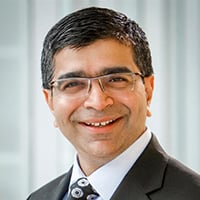What was the need for a clinic for benign esophageal conditions?
Our existing Esophageal and Gastric Multidisciplinary Clinic has predominantly focused on precancerous and cancerous lesions of the esophagus and stomach. We felt we needed a forum for discussing patients with benign complex disorders of the esophagus and stomach. These patients can also suffer a great deal and have significant negative impacts on their overall quality of life. We wanted to provide a similar level of care to these patients in a multidisciplinary format. This clinic, established as part of the Katy O. and Paul M. Rady Esophageal and Gastric Center of Excellence, will primarily focus on complex foregut disorders, such as complex reflux disease, esophageal strictures, and motility disorders including achalasia and gastroparesis. We will have discussions on different endoscopic and surgical modalities for management of these conditions.
Are these patients you have seen previously, or is this a new group of patients? How will they come into the clinic?
Probably a combination of the two, but we expect new patients to be the majority. We anticipate referrals from many different specialties, ranging from primary care physicians (internal medicine and family practice) to ENT physicians, surgeons, and gastroenterologists.
What’s the advantage of a multidisciplinary clinic, and what does that entail?
The conventional approach is that patients see all these different specialists on different days, in different locations, and it can be very difficult for our patients to coordinate and navigate. It can also result in a nonuniform recommendation, given the fact that they're seeing different providers. The multidisciplinary approach allows the patient to be seen by all the relevant specialists on one day, in one room, in one clinic. This also allows the physicians to collaborate even before they see the patient to review all the imaging and other objective data so they have one voice in terms of their recommendation. There's great value in a patient sitting in a clinic and having three or four specialists walk in together and provide this recommendation.
What types of specialists are represented in this clinic?
They include gastroenterologists, thoracic surgeons, surgical oncologists, ENT physicians, pathologists, radiologists, dietitians, and possibly others, depending on the patient’s individual situation.
When someone comes to the clinic, what sort of treatment plan will be developed?
We provide a uniform, consensus-based, patient-centric recommendation in terms of next steps. This could range from conducting additional investigations to recommending a conservative surveillance strategy with medical management. Patients may be further evaluated and managed by GI — going down the endoscopic management route — or the team may feel surgery is the best option.
How is endoscopy used to manage these conditions?
Endoscopic therapies have revolutionized the management of complex foregut disorders. For example, if someone has a complex esophageal stricture, then endoscopic management could entail serial endoscopies with dilations, stricturoplasty, and placement of an esophageal stent if required. Motility disorders such as achalasia and gastroparesis can be managed using endoscopic techniques such as POEM (peroral endoscopic myotomy) and G-POEM (gastric-peroral endoscopic myotomy), respectively. These techniques have been shown to be comparable to surgery in terms of outcomes and avoid the morbidity associated with surgical interventions.
Is there any connection between these benign conditions and esophageal cancer?
Some of them are risk factors for cancer in the future. For example, severe chronic reflux disease is one of the most important risk factors for Barrett’s esophagus and esophageal cancer. Patients who have severe motility disorders are at risk for esophageal squamous cancer and adenocarcinoma. So there is some connection there, but they won’t have cancer or precancerous conditions when they get sent for evaluation in the benign clinic.
Patients may be referred to the Esophageal and Gastric Multidisciplinary Clinic by calling Megan Marsh, MPAS, PA-C, at 720-848-0405 or faxing referrals to 720-848-5245. Each referral will be individually reviewed, and patients may be scheduled for additional testing or imaging prior to their clinic appointment.





